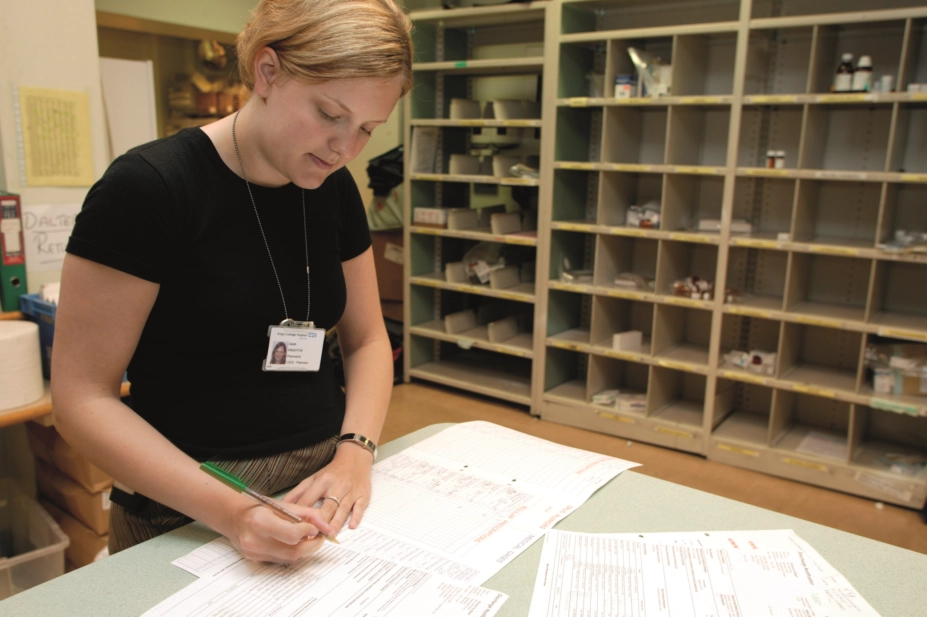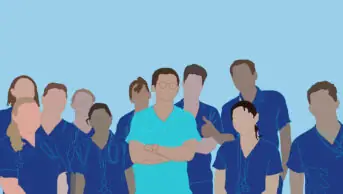
Photofusion Picture Library / Alamy Stock Photo
Placements in hospitals are popular with pharmacy students and it can be a challenge to secure one. Despite the competition, prior hospital experience is not always essential. At London North West Healthcare NHS Trust, applicants who have little or no hospital experience are given priority for placements. After all, the purpose of placements is for students to gain an insight in hospital pharmacy — those who have worked in five hospitals and have accomplished CVs are likely to already have a good understanding about the sector.
Some hospitals may require students to complete local application forms, others may require a CV and cover letter. Placements offered in London and South East England hospitals are advertised on the Health Education England website. Each hospital has specified how to apply, deadline dates, who to contact and details of the placement itself, such as the duration of placement.
Learning through observation
At London North West Healthcare NHS Trust, students can obtain a detailed snapshot of the variety of roles pharmacists have. The students spend time on the ward with pharmacists, such as gastrointestinal specialists and older care specialists, where they can observe medicines reconciliations, medicines optimisation and pharmacy input in multidisciplinary ward rounds. They also attend pharmacy-led anticoagulation clinics where they can see the pivotal role pharmacists have in seeing patients in clinic and the influence they have in the patients’ treatment.
Students also observe how pharmacists train other healthcare professionals by attending the pharmacist–nurse training sessions. They get a chance to observe how pharmacists are integrated in the multidisciplinary team by attending bench rounds with the antimicrobial pharmacist, where they witness conversations between the pharmacist and the microbiologist to decide on the most appropriate antibiotic treatment a patient should have.
Students will also work in medicines information where they may be given examples of typical enquiries received and then asked to use the resources available to answer these enquiries. In the technical services department, they may ‘gown up’ and enter the aseptic unit to observe the procedures used to prepare total parenteral nutrition and chemotherapy. Students may also expect to spend time in the dispensary, dispensing medicines for inpatients and outpatients, as well as observing how the pharmacist screens prescriptions. They can also observe the process of ordering stock medicines in the procurement department.
Collecting data
At London North West Healthcare NHS Trust, students are also given the opportunity to embark on projects and collect data for audits. Last year’s placement students delivered a presentation to the department on their findings of doctors’ compliance with trust antimicrobial guidelines on discharge letters and data from patients about their experience in hospital. This was a good chance for the students to develop their data collection and analysis skills as well as their presentation skills. Carrying out this work and being responsible for a useful project meant that students could see the types of projects typically conducted by preregistration trainees and pharmacists.
Background knowledge
Pharmacy students are not expected to know the entire contents of the British National Formulary (BNF, published by Pharmaceutical Press) when they are on the wards. It would, however, be useful for them to recap their existing knowledge on the speciality before visiting a ward and to consider things they would like to see or ask about.
Students should take notes during their placements. They are likely to remember things they learn on these placements for many years, particularly if it is the first time they are exposed to a clinical environment and have the opportunity to apply what they have learnt at university in practice.
Making the most of it
Placement students are not expected to fill in staff vacancies, for example, in the dispensary, but being flexible, enthusiastic, helpful and hardworking will work in their favour. Students are usually given a timetable to follow during the placement and have a managing pharmacist who they can consult if they have any concerns or queries. However, they are encouraged to be vocal about what their objectives are during their placement and what they would like to see — this would be the best way for them to make the most of their placement.
Reflecting on events and activities is important for self-assessment — it is a good way for students to establish what they know already and then identify what they want to learn and how they can achieve this. This skill will be useful throughout their careers.
Hospital placements are an opportunity for students to see if they can flourish in the hospital environment. Students get a chance to delve into various projects and interact with patients and healthcare professionals. This can help students to develop invaluable insight and various skills which undergraduate education alone cannot provide.
Chinmay Patel, a third-year pharmacy student from University College London, who completed a placement at London North West Healthcare NHS Trust, says: “My understanding of hospital pharmacy has been improved by the variety of tasks and roles, such as spending time with pharmacists on the ward and seeing the level of interaction pharmacists have within the multidisciplinary team; observing pharmacists teaching other professionals; carrying out projects which contributed to the trust; and dispensing critical medicines for inpatients have improved my understanding of hospital pharmacy. It was useful during my preregistration applications and interviews.”
Reading this article counts towards your CPD
You can use the following forms to record your learning and action points from this article from Pharmaceutical Journal Publications.
Your CPD module results are stored against your account here at The Pharmaceutical Journal. You must be registered and logged into the site to do this. To review your module results, go to the ‘My Account’ tab and then ‘My CPD’.
Any training, learning or development activities that you undertake for CPD can also be recorded as evidence as part of your RPS Faculty practice-based portfolio when preparing for Faculty membership. To start your RPS Faculty journey today, access the portfolio and tools at www.rpharms.com/Faculty
If your learning was planned in advance, please click:
If your learning was spontaneous, please click:
You may also be interested in

